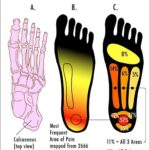 We take approximately 10,000 steps per day. Magnify that impact with poor shoes, bad arch biomechanics, hard surfaces, repetition, and you get Plantar Fasciitis. It can be a debilitating condition, or an awfully annoying reminding pain with each step. With either mask that it wears, it is bothersome, aggravating, and the limitations it puts on your function, is just downright wrong. We provide plantar fasciitis treatment in Denver.
We take approximately 10,000 steps per day. Magnify that impact with poor shoes, bad arch biomechanics, hard surfaces, repetition, and you get Plantar Fasciitis. It can be a debilitating condition, or an awfully annoying reminding pain with each step. With either mask that it wears, it is bothersome, aggravating, and the limitations it puts on your function, is just downright wrong. We provide plantar fasciitis treatment in Denver.
Without knowing our limitations, we really don’t appreciate how good we have it when our plantar fascia is in fine working order. So, your foot really hurts in the morning, it gets slightly better throughout the day, but it is still rather painful to walk on it, and the worst part, is that you really want to be active. Pain pills and stretching havn’t worked? So what does work?
Well, let’s first explore why you have the problem in the first place. This will help form your treatment, and also help modify your future activity to prevent re-occurrence.
The plantar fascia is a critical piece of tissue that helps maintain tension and arch support for the foot. Without proper tension and arch support, weight distribution will be faulty, and problems will occur. It is rare for plantar fasciitis to exists alone, and independent from other problems. This condition is a result of other factors. So treating the symptoms alone will not prevent re-occurrence.
Your approach to this problem needs to be multifaceted, and a good evaluation of the musculoskeletal system is essential for treatment progress. As a chiropractor, many people seek my help for back pain and neck pain, but will also later indicate that they are having signs of plantar fasciitis. This can be similar to the chicken and egg dilemma. Which came first, the back pain, or the foot pain, or perhaps they both came on at the same time.
The problem is usually very complex, and might not be so straight forward. Several areas of the population get this problem, but is most common in athletes, in particular, runners. It is also found frequently in nonathletic women, and acute trauma is rather uncommon.
This leads us to believe that plantar fasciitis is due to an overuse injury, repetitive micro-trauma. Some people can be predisposed by using faulty shoes, bad arches, hard surfaces, obesity, aging, decreased range of motion in any number of joints, and prolonged standing.
If you are suffering from this condition, I urge you to seek the advice of chiropractor, because there are other conditions that mimic plantar fasciitis. Such as, severs disease (seen in young children), calcaneal nerve entrapments, fat pad atrophy, stress fracture, tarsal tunnel syndrome, rheumatoid arthritis, ankylosing spondylitis, gout, and Reiter’s syndrome.
Treatment options can include; manipulation of the joints, ultrasound, electric stimulation therapy, extracorporeal shock wave therapy (Denver Chiropractic, LLC is the only chiropractic clinic in Denver to offer shockwave therapy, cold laser, heat, ice, stretching, massage, strengthening, kinesio taping, athletic taping, activity modification, orthotics, shoe choice, graston technique, cross fiber friction, corticosteroid injections (usually make to problem worse in the long run), posterior night splints, NSAID’s, donut pads under the heel, and weight loss.
The absolute best recommendations that I can give you, is to see a chiropractor. They will help determine what is best for your situation. Denver chiropractic doctors can provide plantar fasciitis treatment in Denver.
Dr. Trent Artichoker MS, DC
Denver Chiropractic, LLC
3890 Federal Blvd Unit 1
Denver, CO 80211
303-455-2225

